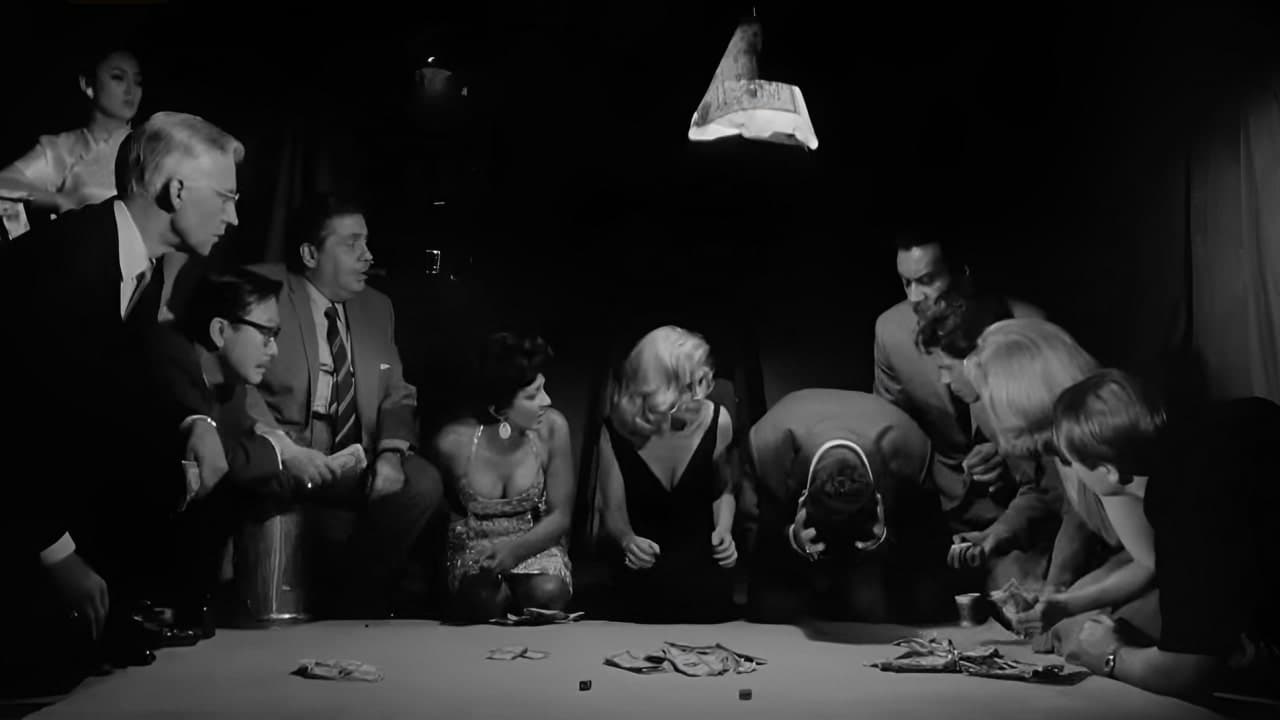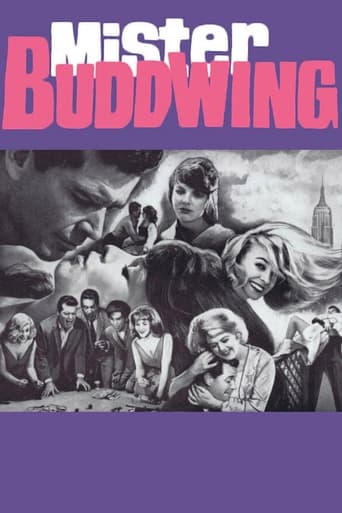

Last night we watched a movie that was positively a revelation: 1966's Mister Buddwing.Starring James Garner, Angela Lansbury, Suzanne Pleshette, Jean Simmons, and Katharine Ross, this offbeat, downright innovative MGM movie, directed by Delbert Mann, received universally condemning reviews, which persist to this day; the exceptions to this effect are those who understood and embraced it, me included. Reviewers on IMDb, TCM, and DVD-review sites either are enthralled with love for it, or they regard it with scornful contempt. It has become something of a cult classic, I think, with good reason: it is fixating, surreal, and arresting all at once. I have never seen anything like it, especially from this time period. In fact, I'd say it was *before* its time, even during the looming jadedness of the late 1960s. It is one of those enticingly strange and weird movies that throws you off the plot-beaten path in the most intensely curious, absorbing way.Garner himself in his book, "The Garner Files" summed it up thusly: "I'd summarize the plot, but to this day, I have no clue what it is. Worst picture I ever made. What were they thinking? What was *I* thinking?"I think Garner either found the role too uncomfortably unfamiliar to really connect with, which is about a man riddled with severe PTSD after a traumatic event in his life. It also could be that the role required too much internally of the notoriously private Garner, who usually played sardonic, wise-cracking types, to tap into and portray deeply troubling emotions; I have never seen this side of him in any role he's ever played - and, being a fan, I've seen most of his movies. The story begins with a subjective-camera view of Garner waking up in New York City's Central Park, with no memory of who he is or where he belongs. Confused and terribly addled, he stumbles around helplessly into situations with utter terror. Trying to create an identity for himself, he simultaneously sees a Budweiser truck and an airplane; therefore he becomes Mister Buddwing (see, I told you it is weird). Buddwing first encounters a kind hearted, slatternly floozie, played by Lansbury. Then he gets involved with 3 women at random, all of whom he thinks is a woman named Grace: first a naive college student played by Ross; then a beatnik actress played by Pleshette; and lastly, with a flaky, boozy socialite played by Simmons. Along the way there are unsettling and tense encounters with other assorted characters, all of them memorably enacted. During his scenes with all of these women, Buddwing imagines flashbacks of lives he thinks he shared with them, with some overlapping similarities running through each plot, and certain elements that seem to provide clues as to his identity and existence.I won't divulge the ending, for those who want to see it, but it is actually rather low-key, and not the wham-bang surprise you'd ordinarily expect; rather, it fittingly resolves the premise.It has been said that Who's Afraid of Virginia Woolf?, which opened a few months earlier than Mister Buddwing, paved the way for frank subject matter in movies. Really?This movie deals with severe mental trauma, themes of suicide, abortion, and even, in one brief instance, a shockingly cynical view of racial matters. The technical aspects are top-notch: the moody, atmospheric black-and-white cinematography, by Ellsworth Fredericks, is artful and marvelously effective: it depicts not just the psychological darkness of the tale, but it shows the seedier parts of New York City already in decline, littered, dilapidated, and forbidding - this is the pre-Midnight Cowboy, foreshadowing of the 1970s grimness of the place.The jazz score, by Kenyon Hopkins, who was one of the most talented and unheralded of screen composers, is superbly evocative and which accentuates the images and situations with keen underlining; and besides, is a pleasure to the ear - it's first-class music, all told. In fact, this movie could very well be a 100-minute episode of The Twilight Zone. Its themes of alienation in an urban setting, a man placed in a hellish maelstrom of existential terror - is exactly the kind of subject Rod Serling favored in his series.The performances are all unforgettable. Lansbury, with a role that is lamentably too brief, is as usual, vivid, engaging, and sympathetic. Pleshette and Simmons, though, are excitingly outstanding, and they play their roles with absolute relish and conviction; both the characters are seriously off-kilter and unbalanced, and the two actresses positively revel in their portrayals. Garner, though, is simply amazing. Handsome as ever, he gives a harrowing, thoroughly engaged performance, really depicting the guy's terror-stricken desperation with almost unbearable intensity. Moreover, he's not only relatable, but is both empathetic and sympathetic: you *feel* his forlorn state, as Buddwing simply doesn't know who he is or where he belongs, and his sheer helplessness is truly pitiable. Garner takes you inside a world that has a bottomless abyss in his character's mind. It is, all told, an Academy Award-winning caliber of a performance. No wonder this movie failed to connect with a mass audience: it's too unsettling and disturbing.
... View MoreSaw this on TCM.The movie looks cool,sounds cool and is way ahead of it's time. The female roles are all outstanding.Not a lot of love for this one out there but I don't know what more people want.
... View MoreGroggy and well-suited, James Garner wakes up in New York City's Central Park with two pills and a phone number in his pocket. Before you can say, "Been there, done that," note Mr. Garner also has amnesia. He decides to call himself "Sam Budweiser" after calling the phone number, seeing a Budweiser beer truck, then a plane. Garner first visits floozy Angela Lansbury (as Gloria). She thinks her drunken husband gave Garner the phone number for a good time. The pills are not explained. In succession, Garner encounters pretty young Katharine Ross (as Janet), sexy actress Suzanne Pleshette (as Fiddle), and blonde lush Jean Simmons - driven on screen by ex-"Dead End" kid Billy Halop! Claiming to be twenty-five years old, "Sam Buddwing" meets several other interesting New Yorkers. Garner is recognized as Jewish by cracker Jack Gilford (as Mr. Schwartz). Shabby old man George Voskovec thinks Garner's a paranoid schizophrenic. Before playing biker Buzz on "Dark Shadows" (1967), counterperson Michael Hadge believes Garner's problems to be psychosomatic. Loved it when Ms. Pleshette tells him, "We'll be tigers and we'll drink blood." You also get Nichelle Nichols tossing dice before her "Star Trek". This could have been a quirky classic with someone like George Segal or Sal Mineo in the lead. Garner needs to play something closer to home, and with a little humor.***** Mister Buddwing (7/15/66) Delbert Mann ~ James Garner, Jean Simmons, Suzanne Pleshette, Katharine Ross
... View MoreI recently saw this on TCM and was surprised that I had never seen this before. Based on the novel by popular novelist/writer Evan Hunter who wrote such classics as The blackboard Jungle and the screenplay for The Birds this was adapted for the screen by Hunter and Dale Wasserman. this is the story of an amnesiac (James Garner) who wakes up on a Central Park park bench with no idea who he is. Dressed in a gray suit he discovers only two possible clues to his identity, a ring with the initials G.V. inscribed and a piece of paper with a telephone number on it. He has the name of Grace in his mind who he assumes must be his wife and so with the lack of a name of his own his creates one on the spur of the moment in Sam Buddwing and begins his search through Manhattan of himself and of Grace. His adventure brings him to several memorable characters in Angela Lansbury as the loose woman with a kind heart Gloria, Suzanne Pleshette as actress Fiddle Corwin, Katherine Ross as the pretty and studious Janet, Jack Gifford as restaurant owner Izzy Schwartz, Joe Mantell as the 1st cab driver, George Voskovec as a shabby old man who calls himself God and Jean Simmons as the high society blonde out on treasure hunt for a party. This film was nominated for two Academy Awards for Best Black and White Art direction and Best Black and White Costume. It has a gritty New York location feel and frequently uses hand-held cameras and is photographed by cinematographer Ellsworth Fredricks. Directed by Delbert Mann best known for directing such classics as Marty, Desire Under the elms and Separate Tables this is not one of his best but it's quirky and interesting and hold your interest thanks to great on screen performances by the fine cast. Garner is better served as an actor when he has some light comedic roles and he falls a little short in this straight dramatic role where he only smiles once briefly in the entire film. The ending falls short too but all in all it's a different film and I would give it a 7.5 out of 10.
... View More